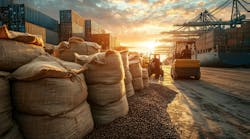After first agreeing with the intent of Congress that “more can and should be done to secure our borders and supply chains,” the International Cargo Security Council (ICSC) stated that H.R. 1 would “impose additional cost burdens on the U.S. economy, negatively impacting businesses—both small and large—with the establishment of cargo security and inspection protocols that rely on unproven technologies and that do not insure security improvements that are commensurate wit the expenses incurred.”
A non-profit organization comprised of companies, individuals and government agencies involved in the safe and secure transport of cargo, the ICSC further pointed out that inspection provisions may complicate compliance with the recently enacted Safe Ports Act. Saying it strongly opposed provisions requiring 100% inspection of ocean containers and air cargo entering the United States, the ICSC said the proposal would add uncertainty and cost to the international supply chain, severely impacting the flow of legitimate trade but with little demonstrable improvement in security.
The ICSC supports expansion of the Customs-Trade Partnership Against Terrorism (C-TPAT) model along with continued testing of new technologies that might be employed when proven. It also supported increased emphasis on intelligence and information sharing.
“A layered, risk-based, targeted approach to cargo security, rather than a one-size-fits-all approach, will provide more effective security with better utilization of limited resources,” said the ICSC.
H.R. 1 was passed in the House and has been received in the Senate and read twice. It was referred to the Senate Committee on Homeland Security and Governmental Affairs.


